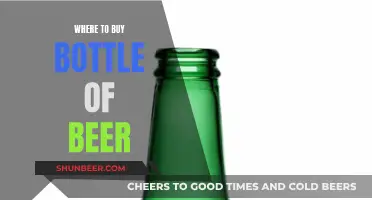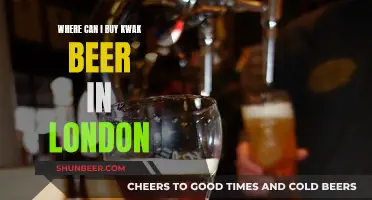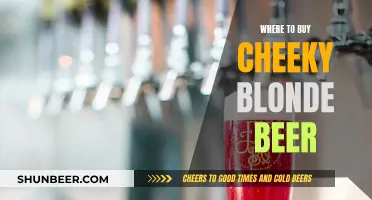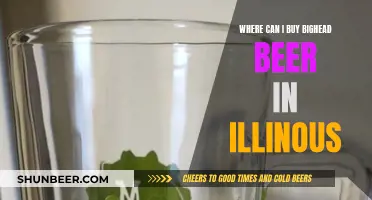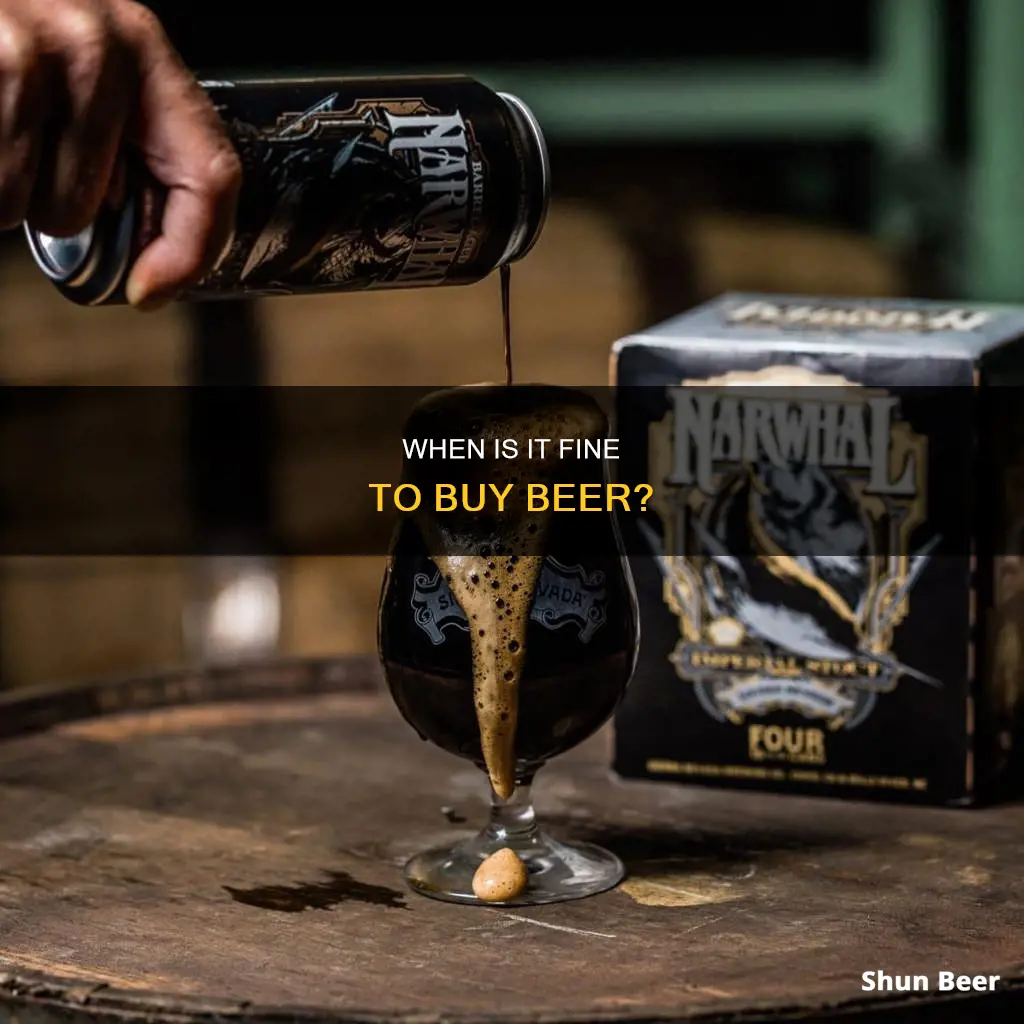
The acceptable time to buy beer varies across the United States, with each state having its own set of liquor laws. These laws are influenced by federal, state, and local regulations, which can make it tricky to determine the specific hours for purchasing beer. In Texas, for example, you can buy beer and wine from 7 a.m. to midnight on weekdays, 7 a.m. to 1 a.m. on Saturdays, and 10 a.m. to midnight on Sundays. On the other hand, Nevada stands out as the only state without any time restrictions on alcohol sales, allowing purchases at any hour as long as the store is open. Understanding the liquor laws in your state is essential to ensure you don't accidentally break any rules when stocking up on beer.
What You'll Learn

Alcohol laws in Texas
Texas has a number of laws regulating the sale and consumption of alcohol. Here is an overview of the key provisions:
Minimum Drinking Age
In Texas, the minimum drinking age is 21 years old. This means that anyone under 21 is prohibited from purchasing, possessing, or consuming alcohol. However, there are some exceptions to this rule. For example, minors may possess and consume alcohol when in the visible presence of their legal-aged parent, guardian, or spouse. Additionally, minors may possess alcohol during the scope of their employment or when assisting a police officer in enforcing the alcoholic beverage code.
Penalties for Underage Drinking and Serving Alcohol to Minors
The penalties for underage drinking in Texas can include fines, community service, and even jail time. A conviction can also have long-lasting consequences, such as difficulty in obtaining a driver's license or securing certain jobs. Similarly, selling or serving alcohol to a minor can result in a $4,000 fine, up to a year in jail, or both. Additionally, the server may be held liable for any damages caused by an intoxicated minor.
Hours of Sale and Consumption
The hours during which alcohol can be sold and consumed in Texas vary depending on the type of beverage and the day of the week. Beer and wine can be sold from 7:00 am to midnight Monday through Friday, 7:00 am to 1:00 am on Saturday, and 10:00 am to midnight on Sunday. Liquor sales are more restricted and are prohibited on Sundays, Thanksgiving Day, Christmas Day, and New Year's Day. Liquor stores are also required to be closed on these days. On other days, liquor sales are allowed from 10:00 am to 9:00 pm.
On-Premises and Off-Premises Consumption
The hours for on-premises consumption, such as at bars or restaurants, differ from those for off-premises consumption, such as at grocery or convenience stores. On-premises consumption is generally allowed from 7:00 am to midnight Monday through Friday, 7:00 am to 1:00 am on Saturday, and 12:00 pm to midnight on Sunday. However, with a late-hours permit, establishments can serve alcohol until 2:00 am any night of the week. Off-premises consumption hours are typically the same as beer and wine sales hours.
Public Intoxication
Public intoxication is illegal in Texas. A person commits this offence if they appear in a public place while intoxicated to the degree that they may endanger themselves or others. This offence is punishable by a fine of up to $500. Additionally, it is illegal to sell or serve alcohol to an intoxicated person, and establishments can be held liable for doing so.
Safe Transportation of Alcohol
All previously opened containers of alcoholic beverages must be stored and transported in a vehicle's trunk or other secure areas that are inaccessible to the driver and passengers. This ensures that alcohol is transported safely and responsibly.
Blood Alcohol Content Limits
In Texas, an operator of a motor vehicle is considered under the influence of alcohol if their blood alcohol content (BAC) is 0.08% or higher. For drivers under the age of 17, any detectable BAC may result in DUI charges.
Alcohol-To-Go Laws
During the COVID-19 pandemic, Texas introduced temporary waivers allowing alcohol-to-go options for businesses. These provisions have since been made permanent, allowing customers to pick up or have alcohol delivered along with food orders.
The Great American Beer Festival: Buying Whole Beers
You may want to see also

Alcohol laws in the US
- Minimum Drinking Age: In most states, you must be at least 21 years old to purchase, possess, or consume alcoholic beverages. This is regulated by the National Minimum Drinking Age Act, which was enacted in 1984. However, some states have exceptions for religious practices, education, or with parental consent.
- Alcohol Licenses and Permits: The sale and distribution of alcohol are regulated by liquor licenses and permits, which are typically issued by the Alcohol and Tobacco Tax and Trade Bureau (TTB). They award these permits to breweries, distributors, and retailers, who are then allowed to sell or distribute beer and other alcoholic beverages.
- Alcohol Content Restrictions: States can regulate alcoholic beverages based on their alcohol content or volume (ABV). For example, California allows the sale of alcohol up to 60% ABV, while anything higher is sold in drugstores or pharmacies.
- Beer Sales Restrictions: Many states restrict the times of day when retailers can sell beer. For example, in Mississippi, beer can only be purchased between 10 am and 10 pm from Monday to Saturday, and alcohol sales are prohibited on Sundays and Christmas Day.
- On-Premises and Off-Premises Sales: On-premises sales refer to drinks consumed within the retailer's premises, such as bars and restaurants. Off-premises sales involve drinks purchased to go, such as from liquor or grocery stores. States may have different regulations for these two types of sales.
- Day Restrictions: In addition to time restrictions, some states have specific days when alcohol sales are prohibited. For example, many southern states do not allow the sale of alcohol on Sundays, while others restrict sales on Christmas Day or other holidays.
- Blood Alcohol Content (BAC) Limits: Throughout the US, it is illegal to drive with a BAC of 0.08% or higher. Violating this law can result in fines, license revocation, and even jail time.
- Public Intoxication: Being intoxicated in public is illegal in most states, and the punishment can vary depending on the state and city.
- Open States vs. Control States: In terms of distribution, states can be categorized as Open or Control states. In Open states, retailers can buy alcohol from private distributors, while in Control states, the state itself serves as the distributor between the manufacturer and retailer.
- Federal Regulations: While alcohol regulation is primarily a state issue, the federal government can regulate the importation and interstate transportation of intoxicating liquors. The federal government also has jurisdiction over liquor sales in Washington, D.C., military reservations, and Native American reservations.
Spotted Cow Beer: Illinois Availability and Legality
You may want to see also

Alcohol laws in Nevada
Nevada has very relaxed alcohol laws compared to most states. There are no time restrictions on the sale of alcohol, and it can be purchased 24 hours a day, seven days a week, including Sundays and public holidays, from any licensed business. There are also no legally mandated closing hours or days for establishments serving alcohol.
Nevada's alcohol laws apply to both residents and visitors, and the state has a zero-tolerance policy for underage drinking. It is illegal for anyone under the age of 21 to consume, possess, or purchase alcohol, except in the presence of a parent or guardian in a private location. The penalty for breaking this law can be up to six months in jail or fines of up to $1,000. If the offender is under 18, they may also face additional penalties, including a driver's license suspension of at least 90 days and up to two years, substance use evaluation, and mandatory rehab at their own expense.
It is also illegal for parents or other adults to provide minors with alcohol or allow underage drinking. This is a misdemeanor offence, and the penalty is up to six months in jail and/or a fine of up to $1,000.
Licensed businesses, including grocery and convenience stores, are authorised to sell beer, wine, and spirits at all times. The minimum age to sell alcohol for off-site drinking is 16, but the seller must be supervised by a manager or someone over 21. The minimum age to serve alcohol or tend a bar is 21.
Nevada law prohibits driving with a blood alcohol concentration (BAC) of 0.08% or higher. For drivers under 21, the limit is 0.02% or higher, and for commercial drivers, it is 0.04% or higher. The penalties for a DUI include jail time, fines, community service, and driver's license suspension.
While public intoxication is not a crime in Nevada, and state law prohibits counties or towns from making it illegal, intoxicated individuals can still be arrested for related offences such as breaching the peace, public urination, trespass, or jaywalking.
Nevada also has specific open container laws that vary depending on the location. In the City of Las Vegas, it is illegal to carry an open container within 1,000 feet of the store where it was purchased, at a bus stop, or within 1,000 feet of a school, hospital, or other specific locations. On the Las Vegas Strip and Fremont Street, pedestrians may carry open containers made of plastic, paper, or aluminium, but glass is always prohibited.
California's Non-Alcoholic Beer Age Restriction Explained
You may want to see also

Alcohol laws in the UK
In the UK, it is illegal to sell alcohol to anyone under the age of 18. The law applies across the UK, and anyone under 18 drinking alcohol in public can be stopped, fined, or arrested by the police. The law also applies to those serving alcohol—it is illegal to sell alcohol without a license, and those selling must be approved by the license holder or bar manager. Licensed premises must also carry out ID checks to ensure their customers are allowed to buy alcohol.
The times that alcohol can be purchased from shops vary across the UK. In England and Wales, most shops are able to sell alcohol for the duration of their opening hours, including 24-hour shops. The only restriction is on Sundays, when alcohol cannot be sold before 10 am. In Scotland, alcohol cannot be sold in shops between the hours of 10 pm and 10 am. In Northern Ireland, most shops can sell alcohol from 11:30 am to 11 pm, and from 12:30 pm to 11 pm on Sundays.
The opening hours of pubs and bars also vary across the UK. In England and Wales, pubs can usually open from 11 am, and the law states that alcohol can be bought and consumed until 11 pm. However, many establishments have extension licenses that allow them to serve alcohol outside of these hours. In Scotland, it is illegal to sell alcohol after 10 pm, but pubs and restaurants can obtain special licenses to serve it later.
It is also illegal to drink alcohol in public in many places in the UK. Local councils can ban drinking in certain areas, and police officers have the power to confiscate alcohol and issue fines. Drinking alcohol is also banned on many public transport services in the UK.
Buying Beer: Anytime Accessibility and Legal Constraints
You may want to see also

Drinking age restrictions
The majority of countries have a minimum legal drinking age of 18. However, this can vary, with some countries setting the minimum age at 19 or 20, and others at 15 or 16. For example, in the United States, the minimum legal age to purchase alcoholic beverages is 21, while in Puerto Rico and the Virgin Islands, the age is 18. In Canada, most provinces have a minimum age of 19, while in Alberta, Manitoba, and Quebec, the minimum age is 18. In Europe, the minimum drinking age is typically set at 18, but there are some countries where the age limit is lower, such as Austria, Belgium, and Germany.
It is important to note that the minimum legal drinking age may not be the same as the age at which individuals can purchase alcohol. For instance, in the United Arab Emirates, the legal drinking age is 18 in Abu Dhabi, but 21 in most other territories, and alcohol is prohibited in Sharjah. Additionally, some countries have complex systems of federal, state, and local laws that govern the purchase and consumption of alcohol, such as the United States.
The legal drinking age is often determined by the potential negative effects of alcohol on adolescents, as their brains are still developing. Alcohol consumption by minors can impact memory, long-term thinking, and hormone balance, and can lead to liver failure. By setting a minimum drinking age, countries aim to reduce the harmful effects of alcohol on young individuals and promote responsible drinking.
Sunday Beer Run in Winston-Salem: Is It Possible?
You may want to see also
Frequently asked questions
In Texas, the hours for buying beer vary depending on the day of the week and the type of establishment. Retail stores, such as convenience stores and grocery stores, sell beer from 7 a.m. to midnight on weekdays, 7 a.m. to 1 a.m. on Saturdays, and 10 a.m. to midnight on Sundays. Bars and restaurants follow a similar schedule, but on Sundays, they can only serve alcohol from 10 a.m. to noon if paired with food. Liquor stores are typically open from 10 a.m. to 9 p.m., Monday to Saturday, and are closed on Sundays and certain holidays.
Yes, some states have more flexible beer purchasing hours. For example, in Arizona, you can buy alcohol, including beer, between 6 a.m. and 2 a.m. every day of the year. Similarly, in Alaska, state liquor laws allow alcohol sales from 8 a.m. to 5 a.m. any day of the week, although local jurisdictions may have more restrictive laws.
Yes, some states have more restrictive beer purchasing hours. For instance, in Mississippi, beer can only be purchased between 10 a.m. and 10 p.m. from Monday to Saturday, and alcohol sales are prohibited on Sundays and Christmas Day. Additionally, some states have dry counties where alcohol sales are banned entirely.
The best way to find out the specific beer purchasing hours for your state or locality is to refer to your state or local liquor authority's website. These websites will provide the most up-to-date and accurate information regarding alcohol sales regulations in your area.


